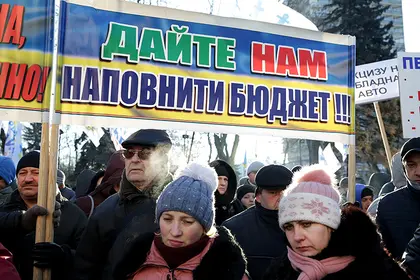Around 500 demonstrators took to the streets outside parliament brandishing fake Hr 500 notes with images of Prime Minister Arseniy Yatsenyuk on them as they urged the government to address inflation and focus its efforts on legalizing Ukaine’s sizable shadow economy, potentially worth billions of dollars in untaxed payments.
Bearing slogans such as “Let us fill in the budget” and “No to excise and to toll raises for cargo vehicles,” activists warned that tax hikes on business and a high rate of income tax risk stoking further social unrest at a time when the country’s currency is rapidly losing value.
JOIN US ON TELEGRAM
Follow our coverage of the war on the @Kyivpost_official.
“We hope that members of all branches of government will do everything possible to prevent the escalation of social discontent and go to dialogue with experts and the public,” cautioned civil society group “Reanimation Package of Reforms.”
“Today they are still willing to discuss the government’s proposals and decisions. Tomorrow they may start speaking a completely different language.”
Ukraine’s post-revolutionary government is under significant pressure from its financial backers at the International Monetary Fund and European Union to finalize its budget before the new year, but was forced to postpone a second reading of its $34 billion budget bill planned for Dec. 28 in the face of fierce criticism.
Ilona Sologoub, an analyst for think-tank VoxUkraine and Research Associate at the Kyiv School of Economics, says that trying to implement the draft budget before establishing a design for decentralization to local government will create confusion.
“Trying to adopt the Budget Code draft as it is now is an attempt to put the carriage before the horse,” she said. “To start the decentralization reform, firstly the functions of the local and central governments should be clearly defined, and then the revenue sources – enough to fund the functions provided to each level of the government.”
She criticized the budget for eliminating the community level of local government, leaving only regional level and central government, arguing that it would reduce local government income and prevent communities from being able to decide what they need.
“It deprives local citizens of the right to control the most vital spheres of their lives – secondary and professional education and healthcare, because these spheres are financed from the central budget,” Sologoub explained.
“For example, the Minister of Education decides whether a school in a certain village should be closed or not. Ideally, people living in this village should decide whether to keep a school open (and then maybe invest in it a little) or to repair a road and provide a schoolbus to the nearest town.”
While they have agreed to an additional round of consultations over the budget, its authors have staunchly defended the proposals, citing the need to reduce Ukraine’s $87 billion debt.
“It’s not possible that everyone likes the new budget,” said Jaresko. “In the 2015 budget the stabilization of balance of payments is essential, temporary additional taxes are therefore implemented to address this issue.”
“We were aiming at keeping a basic level of income and jobs for people. That’s why we made some very difficult decisions on this budget.”
The country’s Minister for Social Policy, Pavlo Rosenko, argued Ukraine had a stark choice if it was to meet IMF requirements to reduce its deficit.
“We can either vote for the current budget project or for increasing pension age and insurance track record, abolishing state student scholarships and lump-sum child allowances,” he said.
Economy Minister Aivaras Abromavicius urged the nation to accept the fiscal plan in the hope that it would result in additional funding from the country’s international partners. The IMF has promised Ukraine $17 billion to support reform, but is releasing the amount in instalments contingent on progress.
“The international community is suffering so-called Ukrainian fatigue, people are tired from bad news from the country,” Abromavicius said. “The approved budget could become a signal of positive news also coming from Ukraine, which would become a prerequisite for (receiving) some concrete sums of money.”
Kyiv Post editor Maxim Tucker can be reached at tucker@kyivpost.com. Kyiv Post staff writer Olena Gordiienko contributed to this report.
You can also highlight the text and press Ctrl + Enter




